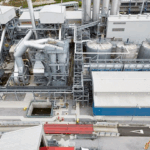One of the UK’s largest housebuilders, Berkeley Group, has warned that a new cladding tax could put the government’s goal of delivering 1.5 million homes by 2029 under “significant pressure.”
The warning comes as property developers grapple with rising costs linked to unsafe cladding remediation, an issue that gained national attention following the Grenfell Tower fire in 2017.
Developers Concerned Over Mounting Costs
The government has already imposed a 4% corporation tax surcharge on developers, alongside an upcoming building safety levy designed to raise up to £3 billion for cladding repairs. While ministers argue the levy will accelerate safety improvements, property firms fear it could slow down construction at a time when the UK is facing a critical housing shortage.
In its latest trading update, released Friday, Berkeley highlighted the “extent and pace of regulatory changes” as a key challenge. The company cautioned that “incremental costs”—such as the cladding levy—could undermine housebuilding efforts.
Berkeley’s concerns echo those of Jennie Daly, CEO of Taylor Wimpey, who recently warned that another “costly requirement” could stifle efforts to build quickly and at scale.
Berkeley’s Position in the Housing Market
Founded in 1976 in Surrey, Berkeley built 3,521 homes in the last financial year, primarily in London and the South East. Under CEO Rob Perrins, the company has also expanded into the rental sector, with plans to manage up to 4,000 homes.
Despite concerns over rising costs, Berkeley reported a “modest improvement in sales reservations” over winter. Stable house prices, rising wages, and better mortgage deals have helped restore buyer confidence, though much depends on interest rate cuts and broader economic stability.
Strong Financial Outlook Despite Industry Challenges
Berkeley remains financially strong, reaffirming at least £975 million in pre-tax profit over the next two years, including £525 million in 2025. Analysts welcomed the “reassuring” update, which saw Berkeley’s shares rise 1.4% to £36.08, though they remain down 26% year-on-year.
Shareholder returns are also in focus. Since December, Berkeley has repurchased £71.3 million of its own shares and plans to return another £156 million by September through additional buybacks or dividends. The next dividend payout of £33 million is due at the end of this month.
While the cladding levy debate continues, developers like Berkeley are urging the government to balance safety reforms with housing targets, warning that excessive costs could slow much-needed homebuilding across the UK.









